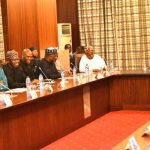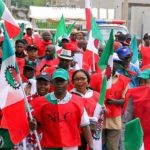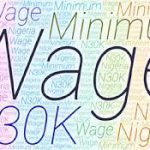Workers in Nigeria received the news of a N70,000 new minimum wage with mixed feelings as they looked forward to its implementation once it becomes a law.
Organised labour has also disagreed with the private sector’s tendency to set conditions for government ahead of the implementation of the new wage.
Moments after the news of the resolution of the impasse on a new minimum wage between the government and labour hit the streets, the organised private sector raised a bit of concern.

The Organised Private Sector, believes government’s support is critical to addressing certain difficulties inflicting economic burden on its members.
Organised Private Sector called for a reversal of the recently increased electricity tariffs and a freeze on new taxes amongst other things to enable its members pay the newly announced wage seamlessly.
But organised labour disagrees with the private sector.
While it calls on government to create an enabling environment for ease of doing business, it insists a synergy between all stakeholders will lead to achieving a living wage for workers in the country.
Emma Ugboaja, the General Secretary of the Nigeria Labour Congress and a frontline member of the tripartite Committee on minimum wage.
Mr. Ugboaja says government must ensure local refineries are up and running
Across offices, workers are glad the struggle for a new wage is over.
They commended the Tinubu administration for the feat but raised concerns about the ability of the private sector to pay the new wage.
Inflation rate stands at about 34.19% and fears are mounting it may rise further with a N70,000 minimum wage.
The National Assembly says it eagerly awaits the bill and promises expeditious passage.
The Speaker, House of Representatives commended President Bola Tinubu for the timely conclusion of the deliberations.
Workers in Nigeria received the news of a N70,000 new minimum wage with mixed feelings as they looked forward to its implementation once it becomes a law.
Organised labour has also disagreed with the private sector’s tendency to set conditions for government ahead of the implementation of the new wage.
Moments after the news of the resolution of the impasse on a new minimum wage between the government and labour hit the streets, the organised private sector raised a bit of concern.

The Organised Private Sector, believes government’s support is critical to addressing certain difficulties inflicting economic burden on its members.
Organised Private Sector called for a reversal of the recently increased electricity tariffs and a freeze on new taxes amongst other things to enable its members pay the newly announced wage seamlessly.
But organised labour disagrees with the private sector.
While it calls on government to create an enabling environment for ease of doing business, it insists a synergy between all stakeholders will lead to achieving a living wage for workers in the country.
Emma Ugboaja, the General Secretary of the Nigeria Labour Congress and a frontline member of the tripartite Committee on minimum wage.
Mr. Ugboaja says government must ensure local refineries are up and running
Across offices, workers are glad the struggle for a new wage is over.
They commended the Tinubu administration for the feat but raised concerns about the ability of the private sector to pay the new wage.
Inflation rate stands at about 34.19% and fears are mounting it may rise further with a N70,000 minimum wage.
The National Assembly says it eagerly awaits the bill and promises expeditious passage.
The Speaker, House of Representatives commended President Bola Tinubu for the timely conclusion of the deliberations.
Workers in Nigeria received the news of a N70,000 new minimum wage with mixed feelings as they looked forward to its implementation once it becomes a law.
Organised labour has also disagreed with the private sector’s tendency to set conditions for government ahead of the implementation of the new wage.
Moments after the news of the resolution of the impasse on a new minimum wage between the government and labour hit the streets, the organised private sector raised a bit of concern.

The Organised Private Sector, believes government’s support is critical to addressing certain difficulties inflicting economic burden on its members.
Organised Private Sector called for a reversal of the recently increased electricity tariffs and a freeze on new taxes amongst other things to enable its members pay the newly announced wage seamlessly.
But organised labour disagrees with the private sector.
While it calls on government to create an enabling environment for ease of doing business, it insists a synergy between all stakeholders will lead to achieving a living wage for workers in the country.
Emma Ugboaja, the General Secretary of the Nigeria Labour Congress and a frontline member of the tripartite Committee on minimum wage.
Mr. Ugboaja says government must ensure local refineries are up and running
Across offices, workers are glad the struggle for a new wage is over.
They commended the Tinubu administration for the feat but raised concerns about the ability of the private sector to pay the new wage.
Inflation rate stands at about 34.19% and fears are mounting it may rise further with a N70,000 minimum wage.
The National Assembly says it eagerly awaits the bill and promises expeditious passage.
The Speaker, House of Representatives commended President Bola Tinubu for the timely conclusion of the deliberations.
Workers in Nigeria received the news of a N70,000 new minimum wage with mixed feelings as they looked forward to its implementation once it becomes a law.
Organised labour has also disagreed with the private sector’s tendency to set conditions for government ahead of the implementation of the new wage.
Moments after the news of the resolution of the impasse on a new minimum wage between the government and labour hit the streets, the organised private sector raised a bit of concern.

The Organised Private Sector, believes government’s support is critical to addressing certain difficulties inflicting economic burden on its members.
Organised Private Sector called for a reversal of the recently increased electricity tariffs and a freeze on new taxes amongst other things to enable its members pay the newly announced wage seamlessly.
But organised labour disagrees with the private sector.
While it calls on government to create an enabling environment for ease of doing business, it insists a synergy between all stakeholders will lead to achieving a living wage for workers in the country.
Emma Ugboaja, the General Secretary of the Nigeria Labour Congress and a frontline member of the tripartite Committee on minimum wage.
Mr. Ugboaja says government must ensure local refineries are up and running
Across offices, workers are glad the struggle for a new wage is over.
They commended the Tinubu administration for the feat but raised concerns about the ability of the private sector to pay the new wage.
Inflation rate stands at about 34.19% and fears are mounting it may rise further with a N70,000 minimum wage.
The National Assembly says it eagerly awaits the bill and promises expeditious passage.
The Speaker, House of Representatives commended President Bola Tinubu for the timely conclusion of the deliberations.
Workers in Nigeria received the news of a N70,000 new minimum wage with mixed feelings as they looked forward to its implementation once it becomes a law.
Organised labour has also disagreed with the private sector’s tendency to set conditions for government ahead of the implementation of the new wage.
Moments after the news of the resolution of the impasse on a new minimum wage between the government and labour hit the streets, the organised private sector raised a bit of concern.

The Organised Private Sector, believes government’s support is critical to addressing certain difficulties inflicting economic burden on its members.
Organised Private Sector called for a reversal of the recently increased electricity tariffs and a freeze on new taxes amongst other things to enable its members pay the newly announced wage seamlessly.
But organised labour disagrees with the private sector.
While it calls on government to create an enabling environment for ease of doing business, it insists a synergy between all stakeholders will lead to achieving a living wage for workers in the country.
Emma Ugboaja, the General Secretary of the Nigeria Labour Congress and a frontline member of the tripartite Committee on minimum wage.
Mr. Ugboaja says government must ensure local refineries are up and running
Across offices, workers are glad the struggle for a new wage is over.
They commended the Tinubu administration for the feat but raised concerns about the ability of the private sector to pay the new wage.
Inflation rate stands at about 34.19% and fears are mounting it may rise further with a N70,000 minimum wage.
The National Assembly says it eagerly awaits the bill and promises expeditious passage.
The Speaker, House of Representatives commended President Bola Tinubu for the timely conclusion of the deliberations.
Workers in Nigeria received the news of a N70,000 new minimum wage with mixed feelings as they looked forward to its implementation once it becomes a law.
Organised labour has also disagreed with the private sector’s tendency to set conditions for government ahead of the implementation of the new wage.
Moments after the news of the resolution of the impasse on a new minimum wage between the government and labour hit the streets, the organised private sector raised a bit of concern.

The Organised Private Sector, believes government’s support is critical to addressing certain difficulties inflicting economic burden on its members.
Organised Private Sector called for a reversal of the recently increased electricity tariffs and a freeze on new taxes amongst other things to enable its members pay the newly announced wage seamlessly.
But organised labour disagrees with the private sector.
While it calls on government to create an enabling environment for ease of doing business, it insists a synergy between all stakeholders will lead to achieving a living wage for workers in the country.
Emma Ugboaja, the General Secretary of the Nigeria Labour Congress and a frontline member of the tripartite Committee on minimum wage.
Mr. Ugboaja says government must ensure local refineries are up and running
Across offices, workers are glad the struggle for a new wage is over.
They commended the Tinubu administration for the feat but raised concerns about the ability of the private sector to pay the new wage.
Inflation rate stands at about 34.19% and fears are mounting it may rise further with a N70,000 minimum wage.
The National Assembly says it eagerly awaits the bill and promises expeditious passage.
The Speaker, House of Representatives commended President Bola Tinubu for the timely conclusion of the deliberations.
Workers in Nigeria received the news of a N70,000 new minimum wage with mixed feelings as they looked forward to its implementation once it becomes a law.
Organised labour has also disagreed with the private sector’s tendency to set conditions for government ahead of the implementation of the new wage.
Moments after the news of the resolution of the impasse on a new minimum wage between the government and labour hit the streets, the organised private sector raised a bit of concern.

The Organised Private Sector, believes government’s support is critical to addressing certain difficulties inflicting economic burden on its members.
Organised Private Sector called for a reversal of the recently increased electricity tariffs and a freeze on new taxes amongst other things to enable its members pay the newly announced wage seamlessly.
But organised labour disagrees with the private sector.
While it calls on government to create an enabling environment for ease of doing business, it insists a synergy between all stakeholders will lead to achieving a living wage for workers in the country.
Emma Ugboaja, the General Secretary of the Nigeria Labour Congress and a frontline member of the tripartite Committee on minimum wage.
Mr. Ugboaja says government must ensure local refineries are up and running
Across offices, workers are glad the struggle for a new wage is over.
They commended the Tinubu administration for the feat but raised concerns about the ability of the private sector to pay the new wage.
Inflation rate stands at about 34.19% and fears are mounting it may rise further with a N70,000 minimum wage.
The National Assembly says it eagerly awaits the bill and promises expeditious passage.
The Speaker, House of Representatives commended President Bola Tinubu for the timely conclusion of the deliberations.
Workers in Nigeria received the news of a N70,000 new minimum wage with mixed feelings as they looked forward to its implementation once it becomes a law.
Organised labour has also disagreed with the private sector’s tendency to set conditions for government ahead of the implementation of the new wage.
Moments after the news of the resolution of the impasse on a new minimum wage between the government and labour hit the streets, the organised private sector raised a bit of concern.

The Organised Private Sector, believes government’s support is critical to addressing certain difficulties inflicting economic burden on its members.
Organised Private Sector called for a reversal of the recently increased electricity tariffs and a freeze on new taxes amongst other things to enable its members pay the newly announced wage seamlessly.
But organised labour disagrees with the private sector.
While it calls on government to create an enabling environment for ease of doing business, it insists a synergy between all stakeholders will lead to achieving a living wage for workers in the country.
Emma Ugboaja, the General Secretary of the Nigeria Labour Congress and a frontline member of the tripartite Committee on minimum wage.
Mr. Ugboaja says government must ensure local refineries are up and running
Across offices, workers are glad the struggle for a new wage is over.
They commended the Tinubu administration for the feat but raised concerns about the ability of the private sector to pay the new wage.
Inflation rate stands at about 34.19% and fears are mounting it may rise further with a N70,000 minimum wage.
The National Assembly says it eagerly awaits the bill and promises expeditious passage.
The Speaker, House of Representatives commended President Bola Tinubu for the timely conclusion of the deliberations.














